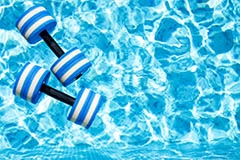Aquatic Therapy for More Strength, Flexibility and Less Pain
Medically Reviewed by: Jackie Hawk, PTA McLeod Sports Medicine
Rehabbing from an orthopedic surgery or injury? Trying to improve your sports performance? Aquatic Therapy might be the answer for you.
“You don’t have to be a great swimmer to benefit from aquatic therapy,” says McLeod Sports Medicine Director Adam Ploeg. “Exercising in the water reaps three specific the benefits. One, water’s buoyancy reduces body weight by 90%, taking stress off bones and joints. Two, water’s density – 800 times that of air – creates unique resistance for exercising. And three, the consistent warmth of a heated pool helps decrease pain during and after exercising.”
RESEARCH FINDINGS
- Research comparing people exercising in water versus on land showed increased muscle power among the aquatic exercisers with significantly less muscle soreness.
- Another study of people with osteoarthritis (wear-and-tear arthritis) of the knee and hip recorded “statistically significant” knee and hip flexibility, strength and fitness following a 12-week aquatic exercise program.
- A study involving women with arthritis showed a 10%-18% increase in strength and range of motion following aquatic exercise therapy.
- People with the more severe rheumatoid arthritis reported less pain, more mobility, better joint movement and less joint tenderness following 8-weeks of aquatic therapy,
- Patients with fibromyalgia also showed improvement in symptoms with warm-water pool exercise.
SPORTS PERFORMANCE
Aquatic Therapy doesn’t fit the stereotype of your grandmother’s water aerobics. Think short distance running, backpedaling and water dumbbell bench pressing used by NFL football players. Think professional athletes in basketball, soccer and track & field working out in the pool or even mixed martial arts UFC fighters who build cardiovascular endurance and flexibility through aquatic therapy.
ACTION YOU CAN TAKE
Ask your physician or coach if aquatic therapy could improve your health condition or sports performance. Then, seek assistance from a sports medicine program or rehabilitation center near you.
Sources include: McLeod Health, Human Kinetics Journal, Journal of Strength & Conditioning Research, Journal of Advanced Nursing, Journal of Aging and Physical Activity, Aquatic Resources Network
-
McLEOD REGIONAL MEDICAL CENTER FLORENCE
843-777-2000 -
McLEOD DARLINGTON
843-777-1100 -
McLEOD DILLON
843-774-4111 -
McLEOD LORIS
843-716-7000 -
McLEOD SEACOAST
843-390-8100 -
McLEOD CHERAW
843-537-7881 -
McLEOD CLARENDON
803-433-3000



-
McLEOD REGIONAL MEDICAL CENTER FLORENCE
843-777-2000 -
McLEOD DARLINGTON
843-777-1100 -
McLEOD DILLON
843-774-4111 -
McLEOD LORIS
843-716-7000 -
McLEOD SEACOAST
843-390-8100 -
McLEOD CHERAW
843-537-7881 -
McLEOD CLARENDON
803-433-3000
 Find a Doctor
Find a Doctor  Locations
Locations  Services
Services 